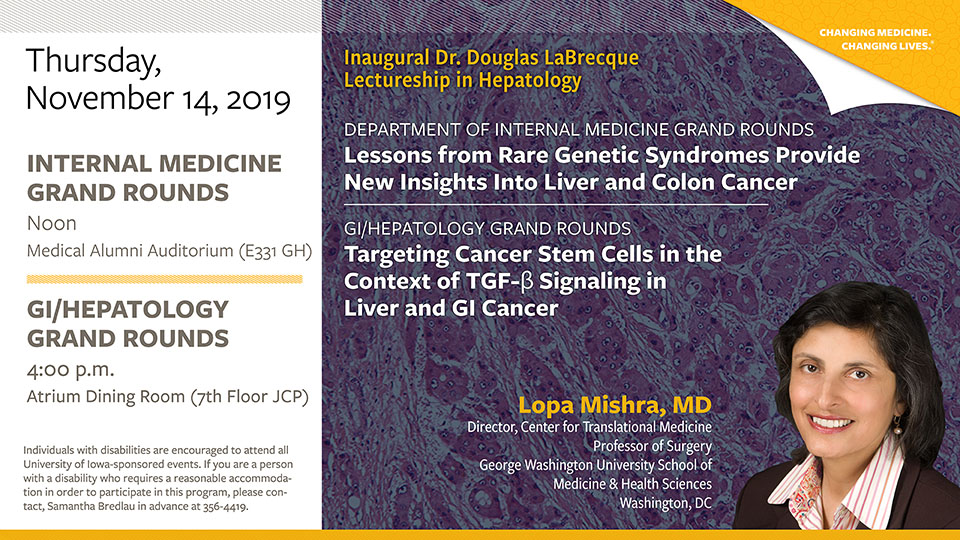More than 40 years ago, Douglas LaBrecque, MD, FACP, Emeritus Professor in the Division of Gastroenterology and Hepatology, moved from San Francisco, California, to the middle of the country with the intent of starting a liver program in Iowa. This week, LaBrecque’s enduring commitment to that vision and to the University of Iowa will be honored at the inaugural LaBrecque Lectureship in Hepatology.
“I want to excite the medical students and staff about liver disease by bringing in top-notch people who know what’s going on. That’s my goal as a teacher here,” LaBrecque said.
This year’s speaker will be Lopa Mishra, MD, professor of surgery at George Washington University’s School of Medicine and Health Sciences. An expert in carcinoma, Mishra has published more than 200 peer-reviewed articles and currently serves as a Councilor-At-Large on the Governing Board of the American Association for the Study of Liver Diseases. LaBrecque plans to continue to bring more women speakers in the future, a nod, he says, in part to one of the first great hepatologists in the field, Sheila Sherlock.
Mishra’s first presentation is on Thursday, Nov. 14, at 12:00 p.m. in the the Medical Alumni Auditorium (E331 GH) during Internal Medicine Grand Rounds. Mishra will deliver a second presentation during GI/Hepatology Grand Rounds at 4:00 p.m. in the Atrium Dining Room (7th Floor JCP). All are welcome.

Although it may receive less media attention than other types of cancer, liver cancer is the fifth-most deadly for men and the seventh deadliest cancer for women. Between 1995 and 2004, LaBrecque pointed out, the top four leading types of cancer—lung, colon, breast, and prostate—significantly decreased in their incidence rates, while liver cancer rates have more than doubled.
LaBrecque also hopes to draw attention to the severity of hepatitis in the United States. Although Hepatitis B is preventable through vaccine and Hepatitis C is treatable, there are still seven million cases of hepatitis nationwide.
“Knowledge of liver disease is sparse, especially in the community,” LaBrecque said. “By bringing world-renowned experts to the university, it will help further raise the knowledge of hepatitis.”
When LaBrecque first arrived at Iowa, the only way to treat cancer was through  radiation or poisoning the cells, and both methods had devastating side effects. He became interested in the correlation between cell growth during liver regeneration and the growth of cancer cells.
radiation or poisoning the cells, and both methods had devastating side effects. He became interested in the correlation between cell growth during liver regeneration and the growth of cancer cells.
“If you remove part of the liver,” he said, “it grows back, but then it stops growing again. Why did it start growing back when it wasn’t growing before? Because it sits there, in either you or me, almost no cells dividing, almost nothing going on.”
Much of LaBrecque’s life’s work has focused on these topics, treating and documenting what he has found. He is a member of the World Gastroenterology Organization (WGO) and founded the World Gastroenterology Organization Foundation. He also chairs the Hepatology Interest Group of the WGO.